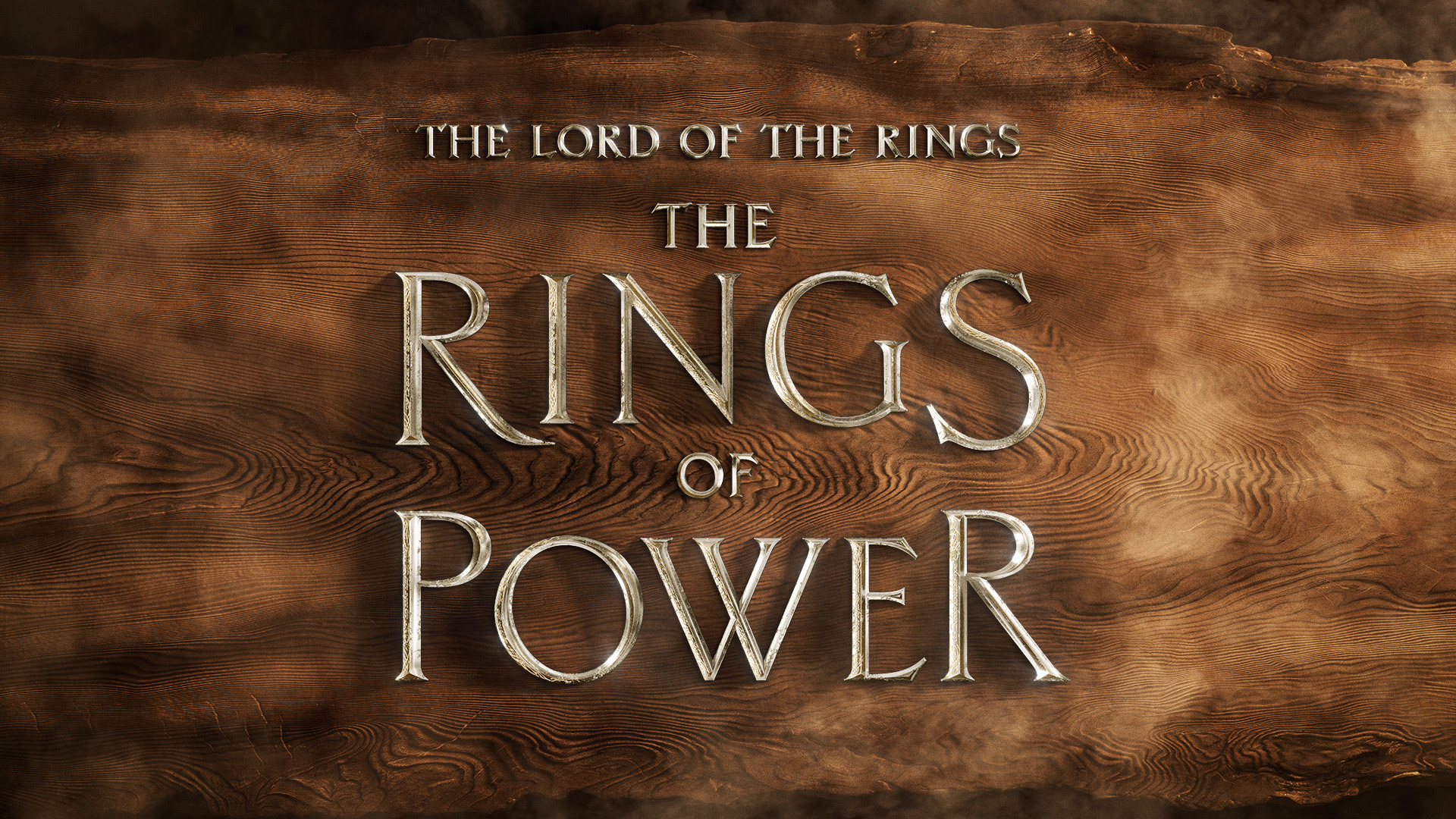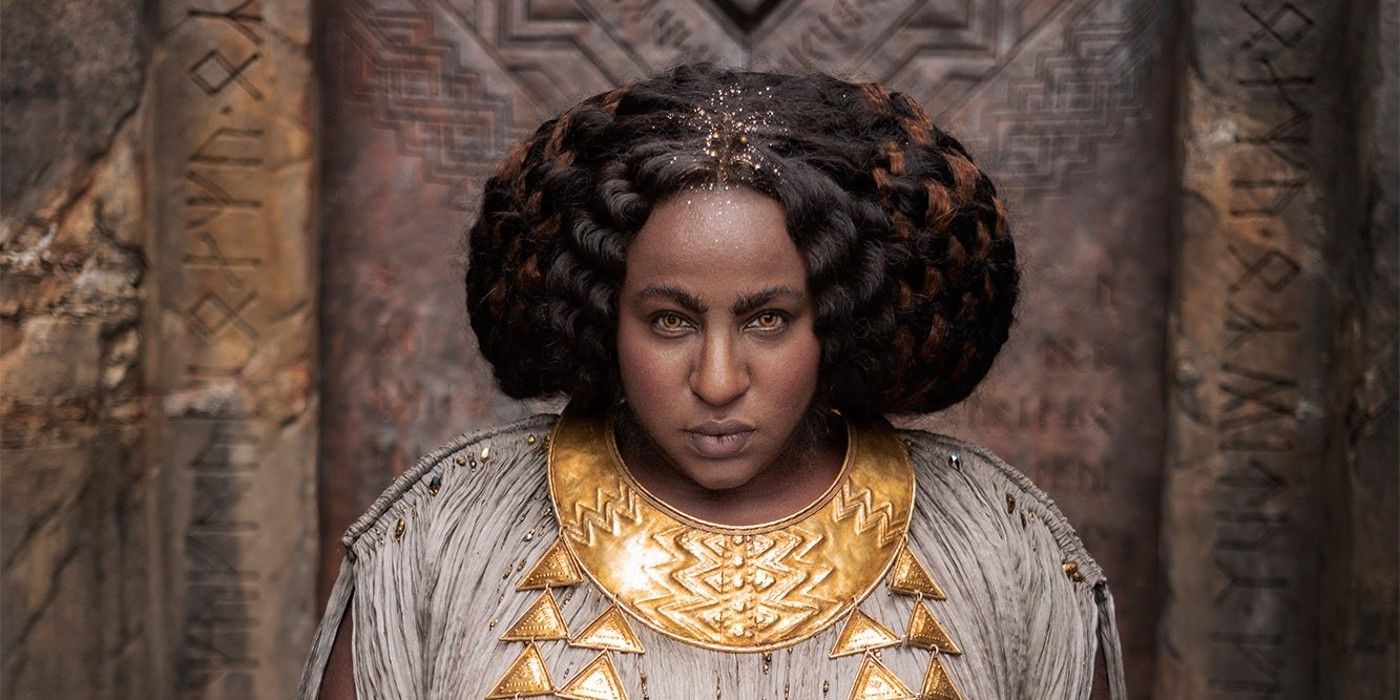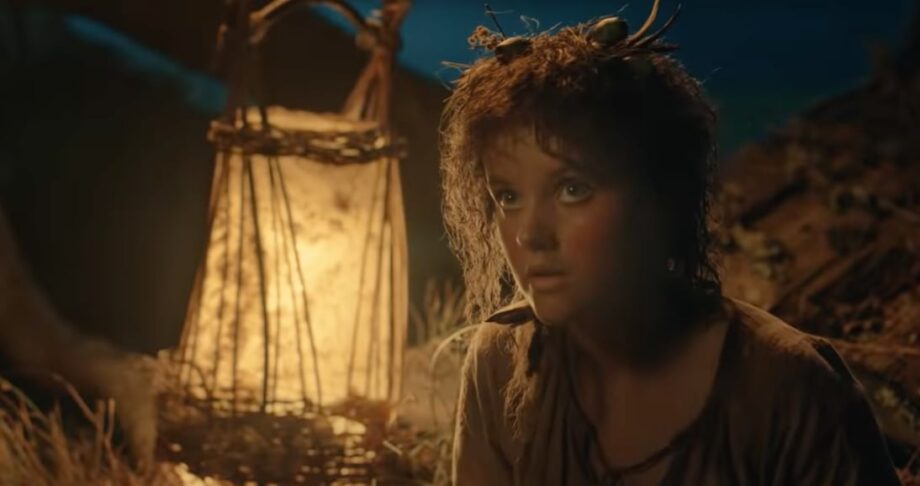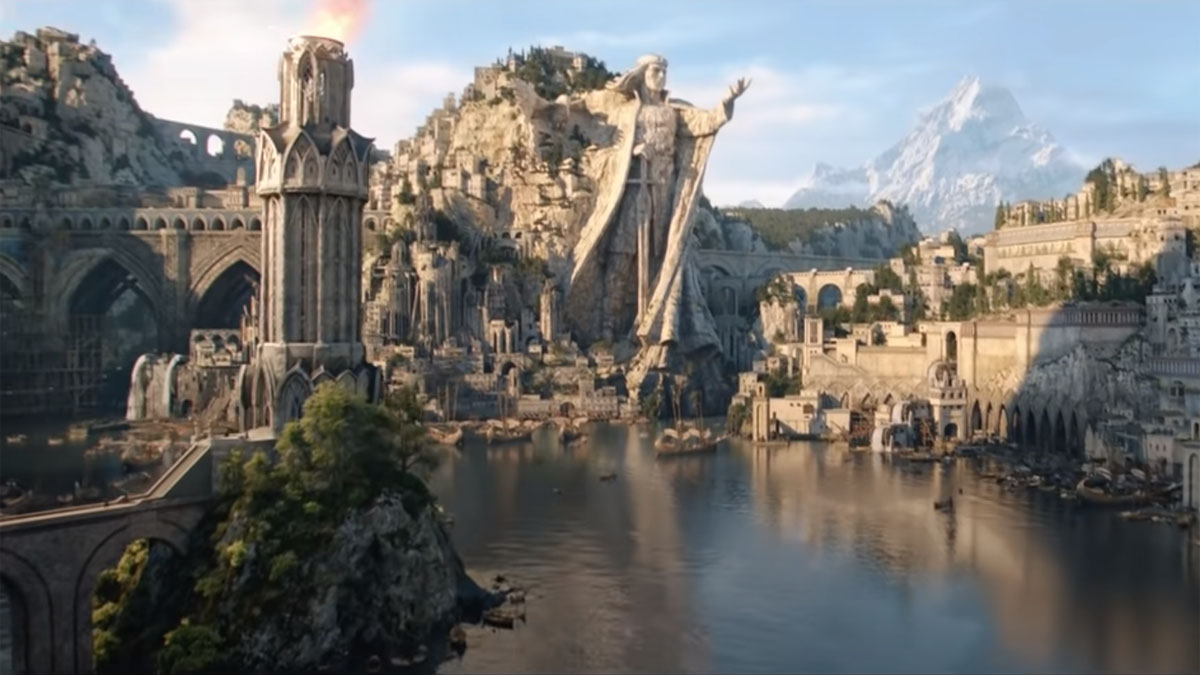 In my post on the title announcement to the new Middle-earth Prime series, The Rings of Power, I admitted to having a split mind and cautious hopefulness about the film serial. I wrote that:
In my post on the title announcement to the new Middle-earth Prime series, The Rings of Power, I admitted to having a split mind and cautious hopefulness about the film serial. I wrote that:
“my confidence is not high that this studio, in this age, is able to create a rich experience for lovers of the literature. The Dune adaptation gives me hope of the possibility of a brilliant, world-evoking film series that extends, enhances, and fills out my reading experience.”
Superbowl night was fun this year not only because it was my first time out after a long period of COVID restriction measures–and not just because it was a good game–but because we got a one-minute trailer on The Rings of Power.
After an initial foray into the Interweb to see what folks were thinking about this new LOTR trailer, I stared at the screen in horror and then slowly backed away from my computer. Social media was lit on fire by people saying the vilest and most disturbing things to one another.
There are a lot of bridges in online Tolkien fandom, and under these bridges lurk a whole host of trolls.
No doubt, some of these trolls have been bred and marked by some tyranny or other, like the Uruk-hai of Peter Jackson’s invention.
And among even the most friendly Tolkienists are those with a kind of terrifying rigour that is intellectually admirable, but is not how I want to talk about Tolkien’s worlds.
What disturbed me most, however, was the entrenched smallmindedness driven by bigotries of two unequal kinds.
 With the introduction of some Black and Brown actors, there is a digital groundswell of indignation. I have no doubt that the studio has encouraged an early response in how they have communicated–like the introduction of Finn to the Star Wars film universe. And I have no doubt that there is just a good deal of ignorance, White presumption, and full-on racism in these responses. During my research for my Master’s thesis on antisemitism, I saw how social media forums about music and horticulture and faith were used to groom young people into all sorts of evil conceptions of people not quite like “them.”
With the introduction of some Black and Brown actors, there is a digital groundswell of indignation. I have no doubt that the studio has encouraged an early response in how they have communicated–like the introduction of Finn to the Star Wars film universe. And I have no doubt that there is just a good deal of ignorance, White presumption, and full-on racism in these responses. During my research for my Master’s thesis on antisemitism, I saw how social media forums about music and horticulture and faith were used to groom young people into all sorts of evil conceptions of people not quite like “them.”
However, I was also disturbed by another response: people who I feel are closer to my tribe, but who reduce any question to the yes/no of racism–as if some of us walk in the world with a kind of pristine cultural view and a heart untainted by the prejudices of era and experience, while all others live their lives looking for pretenses to cloak their hate. Intellectual supremacy has not caused the damage that White supremacy has done, but it betrays the same impetus for a monochromatic worldview rather than one that is enriched by diversity. And, of course, there is still time.
 So, in hesitatingly peeking back in on the digital Tolkienverse yesterday, I watched Corey Olsen‘s IGN interview and reaction to the trailer of The Rings of Power. Playing his role as @TolkienProf (more than, say, just President of Signum University), I like Corey’s approach to the analysis. He seems even more buoyant and hopeful than I am, and thus it buoys my hope.
So, in hesitatingly peeking back in on the digital Tolkienverse yesterday, I watched Corey Olsen‘s IGN interview and reaction to the trailer of The Rings of Power. Playing his role as @TolkienProf (more than, say, just President of Signum University), I like Corey’s approach to the analysis. He seems even more buoyant and hopeful than I am, and thus it buoys my hope.
I still don’t have much faith that this team of filmmakers can give us a precise rendering of Tolkien’s rich and complex world, which I love.
And I have been a little fearful about things that might get in the way in the making of this Middle-earth tale–things like Americanization, commercialization, political decisions about casting or location, big-budget choices on the wrong things but thrift in the details, today’s culture of reaction and rage…. Think of the Star Wars film Attack of the Clones or what happened to the Hobbit films, but in the 2020s.
But if a series can fill out my experience of Middle-earth even a little bit–like the original Peter Jackson LOTR films or the audiobook, visual art, and symphony interpretations of Tolkien’s writing have done, and like Tolkien’s letters or variant drafts of the stories often do–I am pleased for more. I am open to adaptation and know that it is something different than the book or poem it is adapting. So that filling-out experience is my best hope for The Rings of Power.

So, still cautious, but I am a little more hopeful with this trailer and Corey’s analysis.
But then there are the Youtube comments and responses on the @TolkienProf twitter feed. As a university teacher, and as someone who loves living in the land of popular culture, what I find more disturbing than the potential Disneyfication or Hollywoodization or CGIification of Middle-earth is the degree of anger and rudeness in the responses to Corey’s video. That the top comment is an unattributed Tolkien scribble with no comment is an indication of the cultural moment, I’m afraid.
The “beardless dwarves” comment is worth talking about, I think. I would love to read all of the History of Middle-earth volume, The War of the Jewels–or, at least, that section–and have the conversation–deeply, thoughtfully, with texts and minds open to the possibilities. I am up for conversations like that. Meanwhile, this is pretty good–and catches the hopeful possibilities I can see in the new film.
Update: When I said, “I’d like a smart conversation,” it turns out that Profs Corey Olsen and Maggie Parke are going to host just such a thing:






















Many thanks, Brenton. I appear to fall into the best company re: this issue since I see it much as you and Corey do. I’m reasonably certain that since the series is on-going, that it has passed muster with the Estate and the Family, and that’s the best we can hope for. 😉
LikeLiked by 1 person
I don’t know about the Estate and the Family, really. I have my admiration and concerns about most of the estates of authors I love. But the conversation does seem to be ongoing in healthy ways.
LikeLike
Anger and rudeness are perhaps some of the costs of empowering the vulgar, sadistic, and uninformed with a platform. They are bolstered by a belief that their comments are valid. The reasoning behind this is tautological. “Winning” for them does not require critical thinking, just cruelty, deafness, and persistence.
What disturbs me is the apparent and concerted effort to frame of all criticism as toxic. Questioning the retconning of literature to reflect a modern worldview is now one syllogistic leap to being a terrible and reprehensible person.
I share your skepticism that the creators of this program are capable of crafting something “precisely rendered.” I suspect your language there was as carefully considered as Tolkien’s was…
LikeLike
That’s quite a take on “empowerment to the people.” People are sometimes people, it turns out.
Not their words exactly, but here on A Pilgrim in Narnia commenters have called me “a terrible and reprehensible person” because I thought the Peter Jackson films were not ruled out of court in principle. It happens.
I have been careful here…. I wrote it under heat, then heard Corey Olsen talking about it more calmly, then reflected, then wrote what I wanted to say.
LikeLike
I recently moved back to the small dairy farming town I grew up in in rural Western NY. I spent 2 years there before escaping and moving on again. I can say from the “boots on the ground” perspective that that sort of inverse and regressive “empowerment” is very real, and is a two-edged sword. Perhaps you have felt the other edge of that sword. Does that sword hang by a hair?
I think the bottom line is that this IP is based on Literature (with a capital L). It is work of incredible depth. The work has decades of thought, language, and development underlying it. This is a major reason for its persistent resonance, and obsessive and pedantic fanbase. Persons who loved the work prior to it becoming something other than literature may arguably have a more individual and complex relationship with the work, one that is likely closer to what Tolkien intended. It was arguably never created as “product,” or intended to include or reflect our modern world.
Viewing it and exploiting it as a cash cow platform, altering it to reflect modern world messaging, and inventing content that diverges from the source Literature to further these ends SHOULD provoke criticism. The hubris underlying such an undertaking begs criticism, yet seemingly always preemptively discounts it like a narcissist about to be caught in a lie. The very idea that such criticism is toxic by default is, to me, bitterly ironic, as is the level of righteous apologetics being bandied about in many debates. Bearded female Dwarves might not play to the masses on TV, and if that is the case just say so. I could accept that far more easily than shoving some random footnote or a line in some letter in my face and dropping the mic.
LikeLike
This is all very well put. That “criticism is toxic by default” is deeply problematic in most any example I can think of, if it is defined as expressing concern, providing a counterpoint, challenging or reconsidering an argument or idea, providing evidence that puts it in a new light, etc.. I would welcome a good conversation on these things.
I made an argument about the “living text” of Tolkien’s work into various kinds of adaptations. By what you write here, you would disagree with me deeply, say so, and that can be called a critical conversation. But what I received was merely insult. That is not what I mean by “criticism.” If you think that’s warranted, we part ways. But I think that fits in your not here: “shoving some random footnote or a line in some letter in my face and dropping the mic.”
I object to the character of the conversation. I don’t object to a conversation.
btw, I would add that you have a striking command of persuasive prose-writing
LikeLike
I’ve been watching many other discussions on the topic, many poorly referenced and selective in their apparently preemptive rebuttals to criticism. The party line from Amazon in their rebuttals and damage control efforts through client sites is that criticism is toxic by default, or is mislead and/or artificial (bot driven by foreign state actors) at best.
Many apologists use reasoning based on the idea that if it something wasn’t specifically excluded it can be included, and then point to the letters and other materials that support their choices and views. I’m sorry if you took my comment personally or find it offensive. You didn’t drop the mic, and I didn’t mean it to be hurtful.
As for Tolkien being a “living text” – I can understand and support that idea. He created a universe, one in which much can be imagined, and many stories could be told. It is arguable that creating quality stories within such a living text based world would take talent and time to create anything of quality. Talent and time are arguably anathema to modern corporate entertainment goals.
I submit that any new narrative set in Tolkien’s Living Text Universe should have respect for the lore and history of that universe, and tell a story that does not violate the rules and history of the rich universe it occupies. One could imagine a “Tales from Middle Earth” series that inhabits that universe, one that does not bend cherished lore, characters, and narratives to support the preferences or messages of the showmakers or parent corporation. It was possible to create a series within the rights held that possibly could include whatever messaging Tolkien did not include, or see as relevant to his themes and stories without retconning or altering what so many already love.
I would also point out the irony of the fact that the entity and individuals responsible for this new Tolkien product do not have the rights to the letters and other writings that are frequently being used to justify the changes they appear to be making.
LikeLike
I wonder what Tolkien thought of Charles Homer Haskins’s The Renaissance of the Twelfth Century (1927), assuming that he knew it (do we know?). I should probably reread chapter VII, “The Revival of Jurisprudence”, which ends with the sentence, “For good and ill, the lawyer had come as an active element in the world’s government, and he had come to stay.” But I would love to know just what rights the Amazon folk have (do they include the right to keep nearly any- and everyone from knowing just which rights?!), and read an intelligent discussion of them – might John C. Wright, who studied law but never practiced it, be someone who could do that well (if permitted!)?
With reference to bearded female dwarves and “the idea that if isomething wasn’t specifically excluded it can be included”, that looks like it might be the legal situation, if they are allowed to use the Appendices, but not The War of the Jewels, Part Two, chapter 13, ‘Of the Naugrim and the Edain’, ‘Concerning the Dwarves’, section 5 (p. 205). For Appendix A, III, the first paragraph in the Dís and “dwarf-women” section, is open to bearded and/or beardless in its unspecificity and so the in- or exclusion of either or both.
I’d be inclined to go with the reliability of Pengolod and bearded (the only emphatically clear account of the matter I know of in anything by Tolkien published so far) – but that may be something they “do not have the rights to”, if they wanted to back up their ‘wiggle room’ to go with it, too – which (sadly, to my mind), they seem not to – though ‘we’ll see’ – the Tolkien Gateway “Dwarf-women” article includes, of Peter Jackson’s The Hobbit: An Unexpected Journey, “Some Dwarf women can be seen briefly in the beginning of the film, when the story of the destruction of Erebor is told. Some women have beards, whilst some have sideburns of varying length” and I recently saw a still photo from it backing at least part of this up.
A big problem, to my mind – in this world where “For good and ill, the lawyer had come as an active element in the world’s government, and […] had come to stay” – is the legally-unaccountable ‘plausible deniability’ with which they can appear to be ideologically running roughshod over Tolkien’s work and apparent thought, yet present themselves as ‘murdered innocence’ in the face of the contention that that is what they are doing.
LikeLike
Thank you for this. I am very much fearful of this new adaptation, and I have to say my hopes are very low. I am entirely with you when it comes to your worry about Americanisation and politics. Too many wonderful adaptations have been tainted with a flavour of modernisation, and it leaves a horrid taste in the mouth.
LikeLike
We might disagree about what that “flavour” is, perhaps. I liked many of the choices of “Anne with an E,” adapting Anne of Green Gables. It’s a fantasy work there, positing a historical moment that did not and could not have happened, but leaves the story within much we love reading about in the late Victorian period. I think it works. I like the Baz Luhrmann modernization of Romeo and Juliet and some other Shakespearian retellings. I thought the Sherlock BBC series was gorgeous.
Other things I don’t like.
For me, it’s about the synchronicity of the thing. I love the diverse cast choice with a team focussed on Black and Brown filmmakers for Black Panther and A Wrinkle in Time. Both have brilliant lead characters in the film. Black Panter was a genius film and A Wrinkle in Time a stinker. Wanting to do something beautiful–sharing your faith, highlighting women characters or actors of colour, drawing out the environmental concern, focussing on the injustice of slavery, etc.–is beautiful, but just wanting it doesn’t make it a good piece of art. The art has to be good.
And with adaptation, there is the added pressure of making something resonant of the original vision and yet translated both to a new mode (film) and culture. It’s impossible, so I admire when it is done well.
LikeLiked by 2 people
You make an astute point there. And I totally agree. An adaptation is never meant to be an exact replica of an original work.. even Peter Jackson’s Lord of the Rings was not true to the books! I too admire when the art is done well. I only hope to glimpse a fraction of the soul of Tolkien’s’ original work in this new series… at the moment, the trailer did not do that.
LikeLike
I don’t have Amazon Prime and don’t intend getting it purely to watch this adaptation of Tolkien’s legendarium. But I’ll probably catch up with it in due course. I fully expect it will have to be adapted to meet modern sensibilities: Tolkien’s work was socially of its time – in essence, a century ago now (!) – and implicitly reflected the assumptions of English society back then. Today’s society is clearly different on many levels – this quite apart from any specifics associated with American audiences vs British ones – and any adaptation will have to widely engage with its audience of today. Hopefully judiciously. That said, I’d be sorry if decisions to include or alter concepts were made purely because of studio management decisions relative to commercial appeal, as I believe happened with Jackson’s rather peculiar adaptation of The Hobbit.
LikeLike
Hi Matthew, I suspect I will get Prime for those weeks, anyway. We’ll see. I haven’t watched “TV” (scheduled) in years!
Perhaps see my note on “modern” to Ocean Bream just above. I can’t imagine a studio today could make a film that didn’t “include or alter concepts … made purely because of studio management decisions relative to commercial appeal.” That’s cynical, and I still want to enjoy this, but still.
LikeLiked by 1 person
“The ‘beardless dwarves’ comment is worth talking about, I think. I would love to read all of the History of Middle-earth volume, The War of the Jewels–or, at least, that section–and have the conversation–deeply, thoughtfully, with texts and minds open to the possibilities. I am up for conversations like that ” Indeed! That seems like a howler on Corey Olsen’s part, given The War of the Jewels, Part Two, chapter 13, ‘Of the Naugrim and the Edain’, ‘Concerning the Dwarves’, section 5 (p. 204). Some of that section is close in phrasing to LotR Appendix A, III, the first paragraph in the Dís and “dwarf-women” section, but, as (according to Christopher) it dates “from the years following the completion of The Lord of the Rings” (p. [173]) it could be considered an expansion of its matter. But that does not make it Tolkien’s last word on the subject. Carl Hostetter, in The Nature of Middle-earth, Part Two, V, published a text he entitled “Beards” written after 9 December 1972, with a footnote including “All male Dwarves had them” – with “male Dwarves” italicized. But what weight does that have: in a discussion of male characters, and leaving open the possibilities of implication that ‘no female Dwarves had them’ or ‘Only some female Dwarves had them’? Carl Hostetter has a footnote quoting an earlier work, ‘The Shibboleth of Fëanor’ that Elves developed beards latter in life. Might one extrapolate that to (some) Dwarves, including (some) female Dwarves? And there is the question of ‘ostensible’ sources: is Pengolod correct in saying “the Naugrim have beards from the beginning of their lives, male and female alike”. And (if I paraphrase correctly), as Christopher says somewhere, Tolkien’s latest word on a subject cannot be assumed to be his final word, given the way he worked.
I’ve only seen the first 11 minutes of the ‘Other Minds and Hands’ broadcast as uploaded on YouTube – how did it go, in general, after all the initial technical problems? And was much said of “beardless dwarves”?
LikeLike
Oops! p. 205!
LikeLiked by 1 person
Great response, David. My Nature of ME is in the mail, I hope. Things happen more slowly in Canada .. except heart disease and diabetes. We’re faster there.
Great comment on beards! Well done. I haven’t watched it all yet either, but I wanted to respond to your great note before it disappears from my mind (and before I disappear digitally to a weekend of family pizza night, chopping wood, changing lightbulbs, playing bass in the church band–good stuff, but not online stuff).
And your note makes me wonder how much some of the online heat is a kind of Shibboleth of “real Tolkien lovers.” And how much is a Shibboleth on conservative or liberal thought. And so on.
LikeLike
I see there is now a full-length version of the ‘Other Minds and Hands’ broadcast uploaded on the Signum University YouTube channel (to catch up with!).
LikeLike
I think it’s great to have BIPOC people in the Tolkien universe.
The visuals of the cities and landscapes look cool.
I just share your misgivings about how they will make the story.
At least Tolkien wanted others to create new stories in the Middle Earth universe, so there’s that. (Ursula Le Guin told people to get their own universe to play in.)
LikeLike
Sorry, a few weeks behind in my responses! You capture all my thoughts.
LikeLike
Pingback: Dour and Daft Canada Day Reflections of a Prince Edward Islander Speaking in a Nuclear Age, or Words I Don’t Use on Youtube or in Speeches | A Pilgrim in Narnia
Pingback: J.R.R. Tolkien’s Texts on The (Down)Fall of Númenor | A Pilgrim in Narnia
Pingback: A Brace of Tolkien Posts for his 132nd Birthday (#TolkienBirthdayToast) | A Pilgrim in Narnia